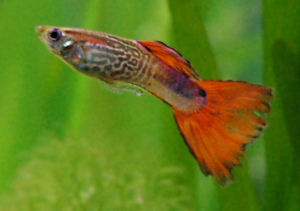 It has long been observed– though not scientifically– that women seem to show a vague preference for men who are already spoken for. This observation is known as the wedding ring effect, and there are numerous competing theories as to why it may be. Some suggest that the wedding ring is a cue that a man is "safe," a passing opportunity for empty flirting; while others theorize that the female psyche sees the ring as an indication that another woman has deemed him worthy. There is also the possibility that the increase in feminine attention is purely imagined, a way for a married man to reassure himself that he's still got "it" (or for that matter, that he ever had "it" to begin with).
It has long been observed– though not scientifically– that women seem to show a vague preference for men who are already spoken for. This observation is known as the wedding ring effect, and there are numerous competing theories as to why it may be. Some suggest that the wedding ring is a cue that a man is "safe," a passing opportunity for empty flirting; while others theorize that the female psyche sees the ring as an indication that another woman has deemed him worthy. There is also the possibility that the increase in feminine attention is purely imagined, a way for a married man to reassure himself that he's still got "it" (or for that matter, that he ever had "it" to begin with).
It is weighty philosophical matters like these which have plagued civilization since its inception, but like so many of the great riddles, the answer may be found in a fish–in this case in a little matter called guppy syndrome.
The animal kingdom analog of the wedding ring effect is called the guppy syndrome because it was in the guppy that it was first documented. Perhaps it is more properly called mate-choice copying. To observe the effect one takes a large tank filled with female guppies, and adds about the same number of relatively indistinguishable male guppies. It doesn't take too long for the guppies to get adjusted to the new environment and, like any society, they soon begin mating. As is true with most species, it is the females who determine who gets to score, and an odd thing occurs: despite the fact that the males are all pretty much alike, some guys get all the luck, and others are spurned.
Why are the females all lining up to mate with a small, eclectic group of males? Is there a subtle physical difference that the females are basing their choices upon? Is there something in their social countenance? Are some of the males just too smart to make good mates?
 In 1996 when this effect was first identified, a myriad of cruel scenarios were introduced to discover what was happening–for some reason, many scientists have a keen interest in finding out what makes individuals more attractive to the opposite sex. Generally a female guppy is attracted to a male with more color, but they found if a female is given the choice between a lonely but very colorful male and a lesser-colored but actively mating male, she'll go against norms and choose the male with less color. When a group of females are separated and allowed to watch a male and female going at it, that male is generally quite popular with the ladyfish when everyone is allowed to mingle again; this holds true even after more males are introduced.
In 1996 when this effect was first identified, a myriad of cruel scenarios were introduced to discover what was happening–for some reason, many scientists have a keen interest in finding out what makes individuals more attractive to the opposite sex. Generally a female guppy is attracted to a male with more color, but they found if a female is given the choice between a lonely but very colorful male and a lesser-colored but actively mating male, she'll go against norms and choose the male with less color. When a group of females are separated and allowed to watch a male and female going at it, that male is generally quite popular with the ladyfish when everyone is allowed to mingle again; this holds true even after more males are introduced.
There are a couple of theories as to why this happens. Perhaps the sight of unabashed sexual congress drive the females into a frenzy of passion. Maybe the females assume that the male's previous partner had discovered some inconspicuous yet crucial quality that made him a superior mate. Or perhaps practice is the key to being a good mate, and females will always pick the male they know has put in some hours.
Mate-choice copying can be observed in several species of fish and birds, but the real question is: can we extrapolate this behavior to humans? Fish aren't known for their intelligence, rationale, or discrimination, so there are plenty of people who say that one can see this happening in people too.
In a singles' bar one might observe that there is a group of men who receive the lion's share of courting, but that's as far as the analogy dares to go. In the night club there is no uniformity among the men, nor are there any controls over the assertiveness of potential suitors; there is very rarely copulation in full view of all the attendees. Those pesky "scientific ethics" hinder any effort to reproduce the Guppy Syndrome with humans in a controlled environment.
Since no one is willing to replicate the circumstances of the guppy syndrome for people, one can only speculate about the contortions a human mind makes in mate-choice copying. The Wedding Ring Effect is one such contortion, but once again those damnable ethics bar us from doing any really sordid testing. In one disappointingly tame attempt to study this, a woman was sent to sit in a bar for a long time.  Sometimes she wore a wedding ring, and others not. Observers tracked how often she was approached. Their findings suggested that heterosexual human males don't pay attention to jewelry– whether or not she brandished a wedding band made little difference in terms of philandering frequency.
Sometimes she wore a wedding ring, and others not. Observers tracked how often she was approached. Their findings suggested that heterosexual human males don't pay attention to jewelry– whether or not she brandished a wedding band made little difference in terms of philandering frequency.
Another, better-devised experiment was conducted where women were shown a series of photographs and asked to indicate which man they preferred. The moderately creepy cards had similar men's faces on the left and right, and a woman's face in the center; in each she was looking at one of the men, and wearing either a smile or a neutral expression. After perusing the array, the women generally indicated that the men receiving the virtual positive feminine attention were the more desirable.
So it seems there is some guppy in us and our mating techniques, though it's hard to say just how much. So far, only one practical application of the data has arisen: in the wild one might sometimes spy a guy in a white lab-coat brandishing a life-sized portrait of a woman's face that smiles toward him. Thanks to steady march of scientific progress, the fish-probing researcher of today just might be the ladies' man of tomorrow.






1 comments:
Just like women, guppies all talk about what he's like and word spreads!
*Note to married women - Don't brag about your man!*
Post a Comment